Porvoo
Porvoo (Finnish pronunciation: [ˈporʋoː]; Swedish: Borgå [ˈbǒrːɡo] (![]()
Porvoo Porvoo – Borgå | |
|---|---|
City | |
| Porvoon kaupunki Borgå stad | |
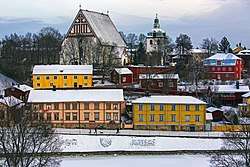 A view of buildings in the Porvoo Old Town, including the Porvoo Cathedral | |
 Coat of arms | |
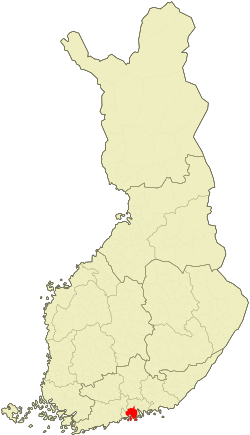 | |
| Coordinates: 60°23′40″N 25°39′50″E | |
| Country | |
| Region | Uusimaa |
| Sub-region | Porvoo sub-region |
| City rights | c. 1380 |
| Government | |
| • City manager | Jukka-Pekka Ujula |
| Area (2018-01-01)[1] | |
| • Total | 2,139.81 km2 (826.19 sq mi) |
| • Land | 654.70 km2 (252.78 sq mi) |
| • Water | 1,484.49 km2 (573.16 sq mi) |
| Area rank | 131st largest in Finland |
| Population (2019-01-31)[2] | |
| • Total | 50,345 |
| • Rank | 21st largest in Finland |
| • Density | 76.9/km2 (199/sq mi) |
| Population by native language | |
| • Finnish | 64.9% (official) |
| • Swedish | 31.6% |
| • Others | 3.5% |
| Population by age | |
| • 0 to 14 | 18.5% |
| • 15 to 64 | 67% |
| • 65 or older | 14.5% |
| Time zone | UTC+02:00 (EET) |
| • Summer (DST) | UTC+03:00 (EEST) |
| Municipal tax rate[5] | 19.25% |
| Climate | Dfb |
| Website | www.Porvoo.fi |
The Porvoo Old Town is a popular tourist destination, known for its well-preserved 18th and 19th century buildings and 15th century cathedral, the Porvoo Cathedral. The Old Town together with Porvoonjoki River Valley is recognized as historically and culturally significant as one of the National landscapes of Finland. Porvoo is internationally considered to be one of the most beautiful towns in Finland.[6]
The municipality's official languages are Finnish and Swedish. In 2014, 64.6% of the population spoke Finnish as their native language, while 30.1% were Swedish speakers. 5.4% had a different native language.
Porvoo's neighbouring municipalities are Askola, Loviisa, Myrskylä, Pornainen, and Sipoo; and the sub-region maintained by Porvoo includes Askola, Myrskylä and Pukkila.
Etymology
The town received its name from a Swedish medieval fortress near the river Porvoonjoki, which flows through the town. The name Porvoo is the Fennicised version of the Swedish name (Borgå) and its parts of borg, meaning "castle", and å, "river".[7]
History
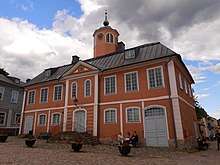
The area of Porvoo has been inhabited since the Stone Age.[8] In pre-historic times, the river Porvoonjoki was a route of commerce for Finnish tribal Tavastians who primarily inhabited the inland regions. The Tavastians also had some permanent settlements in the area, such as the village of Hattula (later Strömsberg), which was named after an inland Tavastian village. The original name of the river Porvoonjoki was possibly Kukinjoki. The name derives from the name of the trade vessel cog which was a common merchant ship in the Baltic Sea in medieval times. The early center of the area was Saksala, meaning "the place of the Germans", and deriving from the merchants who were trading in Saksala.[9][10]
Porvoo was colonised by Swedes in the 13th and 14th centuries after the so-called Second Crusade against Tavastians in 1249–1250. The colonisation was led by the Catholic Church and the kingdom of Sweden. The colonists originated from Svealand, and were provided with seeds, cattle and, tax exemption for four years.[10]
The oldest known written mentions of Porvoo are from the early 14th century. In circa 1380, Porvoo became the third town in Finland to be granted official town rights, after Turku in 1229 and Ulvila in 1365.[11] Due to land rise and loss of shipping access, Ulvila lost town rights to nearby Pori in 1558.[11]
The old city of Porvoo was formally disestablished and the new city of Porvoo founded in 1997, when the city of Porvoo and the rural municipality of Porvoo were consolidated.[12] When Sweden lost the city of Vyborg to Russia in 1721, the episcopal see was moved to Porvoo in 1723.[13][14] At this time, Porvoo was the second largest city in Finland.
In 1760, roughly two-thirds of all buildings in Porvoo burned to the ground in a conflagration. During rebuilding, the city planning wasn't altered, instead new buildings were built upon the existing medieval foundations.
After the conquest of Finland by Russian armies in 1808, Sweden had to cede Finland to Russia in 1809 (the Treaty of Fredrikshamn). The Diet of Porvoo in 1809 was a landmark in the History of Finland. The Tsar Alexander I confirmed the new Finnish constitution (which was essentially the Swedish constitution from 1772), and made Finland an autonomous Grand Duchy. In 1923, six years after Finland's independence, the former Diocese of Vyborg, which operated in Porvoo, was replaced by a current Swedish-speaking diocese of the Evangelical Lutheran Church of Finland, the Diocese of Porvoo.[14]
The Porvoo Common Statement is a report issued at the conclusion of theological conversations by official representatives of four Anglican churches and eight Nordic and Baltic Lutheran churches in 1989–1992. It established the Porvoo Communion, so named after the Porvoo Cathedral where the Eucharist was celebrated on the final Sunday of the conversations leading to the Statement.
Urban development
Old Town
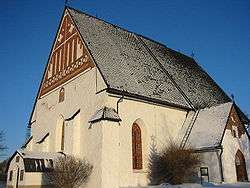
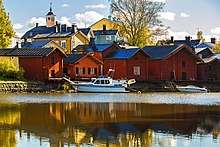
The town is famed for its "Old Town" (Gamla Stan in Swedish), a dense medieval street pattern with predominantly wooden houses from the 17th and 18th centuries. The Old Town came close to being demolished in the 19th century by a new urban plan for the city, but the plan was canceled due to a popular resistance headed by Count Louis Sparre. With the need for growth, a plan was envisioned for a new town built adjacent to the Old Town, following a grid plan, but with houses also built of wood. Jokikatu (located eastside of the Porvoonjoki River) is one of Porvoo's pedestrian streets, and like the other similar streets of the Old Town, it also includes a variety of restaurants, coffeehouses, antique shops and other stores.[15]
The central point of the old town is the medieval, stone and brick Porvoo Cathedral. The cathedral gave its name to the Porvoo Communion, an inter-church agreement between a number of Anglican and Lutheran denominations. The cathedral is reminiscent of similarly aged churches across Finland, such as the Church of St. Lawrence, Vantaa, as they were designed by the same person, the anonymous German architect Pernajan mestari. The cathedral was damaged by fire on 29 May 2006; the roof was totally destroyed but the interior is largely intact. A drunken youth had started a fire at the church, unaware of recent tar work and nearby tar containers, accidentally causing a large conflagration. He was later sentenced to a short prison term and restitutions of 4.3 million euro.[16]
The red-coloured wooden storage buildings on the riverside are a proposed UNESCO World Heritage Site. The Old Town is a significant source of tourism in the area. Visitors to the capital Helsinki can embark on day trips to visit the older city. The Old Town also hosts various events, such as an annual Christmas market.
Later developments

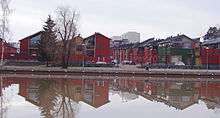
By the end of the 20th century, there was pressure to develop the essentially untouched western side of the river. There was concern that growth would necessitate the construction of a second bridge across the river into the town, thus putting further strain on the aging wooden town. An architectural competition was held in 1990, the winning entry of which proposed building the second bridge. Plans for the western side of the river have progressed under the direction of architect Tuomas Siitonen, and both a vehicle bridge and a pedestrian bridge have been built. The design for new housing is based on a typology derived from the old storehouses on the opposite side of the river. Yet another new development entails the construction of a large business park called King's Gate (Finnish: Kuninkaanportti, Swedish: Kungsporten), which is under construction.
The Porvoo railway station does not have a regular train service, but special museum trains from Kerava (either with steam locomotives or former VR diesel railcars from the 1950s) operate on summer weekends.[17]
Villages
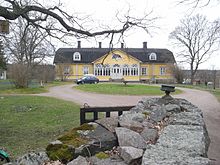
Suomenkylä
Suomenkylä (Swedish: Finnby) is a village north of the centre of Porvoo and beside the Porvoo river. Suomenkylä has an old school founded by Johannes Linnankoski in 1898. The village of Suomenkylä also has two burial places from the Bronze Age.
Kerkkoo
Kerkkoo (Swedish: Kerko) is a village north of the centre of Porvoo and beside the Porvoo river. It has an active school that is over 100 years old. In the village of Kerkkoo, archeologists and townspeople found a stone axe from the Bronze Age.
Other villages
Ali-Vekkoski (Söderveckoski), Anttila (Andersböle), Baggböle, Bengtsby (Pentinkylä), Bjurböle, Boe (Häihä), Bosgård, Brattnäs, Eerola (Eriksdal), Eestinmäki (Estbacka), Emäsalo (Emsalö), Epoo (Ebbo), Fagersta, Gammelbacka, Grännäs, Gäddrag, Haikkoo (Haiko), Henttala, Hinthaara (Hindhår), Hommanäs, Huhtinen, Hummelsund, Ilola (Illby), Jakari (Jackarby), Järnböle, Kaarenkylä (Karsby), Kalax (Kaalahti), Kallola, Kardrag, Karleby (Kaarlenkylä), Kiiala (Kiala), Kilpilahti (Sköldvik), Klemetti (Klemetsby), Kortisbacka, Kreppelby, Kroksnäs, Kråkö, Kulloo (Kullo), Kurböle, Kuris, Londböle, Mickelsböle, Munkkala (Munkby), Mustijoki (Svartså), Myllykylä (Molnby), Norike, Nygård, Onas, Orrby (Orrenkylä), Pappilanmäki (Prästgårdsbacken), Peippola (Pepot), Pellinki (Pellinge), Piirlahti (Pirlax), Ramsholmen, Renum, Saksala (Saxby), Sannainen (Sannäs), Seitlahti (Seitlax), Sikilä (Siggböle), Skavarböle, Sondby, Stensböle, Sundö (Suni)), Svartbäck, Tamminiemi (Eknäs), Tarkkinen (Tarkis), Teissala (Teisala), Tolkkinen (Tolkis), Tirmo (Tirmoo), Treksilä (Drägsby), Tuorila (Torasbacka), Tyysteri (Tjusterby), Vaarlahti (Varlax), Vanhamoisio (Gammelgård), Veckjärvi (Vekjärvi), Virtaala (Strömsberg), Virvik, Voolahti (Vålax), Västermunkby, Ylike, Yli-Vekkoski (Norrveckoski), Åby, Åminsby.
Sports
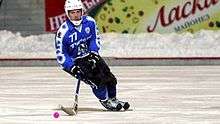
The local team Borgå Akilles plays the sport of bandy, in the highest division, Bandyliiga, and has become Finnish champions twice.
Sami Hyypiä, a former football player for Liverpool and the Finnish national team, originated from Porvoo.
Lauri Happonen, better known as Cyanide, a retired League of Legends professional player, is from Porvoo.
Culture
Food
A well-known Porvoo delicacy, a Runeberg torte, was developed by a local pastry master, and it is said that J. L. Runeberg ate them for breakfast. Fredrika Runeberg, the wife of the national poet also made tortes for her husband using the substances that happened to be found in the cupboards: wheat and breadcrumbs, biscuit crumbs, almonds, apple jam and sugar.[18]
In addition to Runeberg torte, the second parish dish in Porvoo was grilled herring with onion rings and dill in the 1980s. Pellinki's fish soup and nettle soup were chosen as the main dishes of the Porvoo countryside.[19]
Porvoo is also known for its local confectionery and ice cream factories, the most notable being Brunberg Chocolate Factory[20] and the Old Porvoo Ice Cream Factory (Vanhan Porvoon Jäätelötehdas).[21]
Transport
Porvoo is on the route of the E18 road from Helsinki to St Petersburg, and the Porvoo Highway (part of the Finnish national road 7) along that route is one of the most important transport connections to Helsinki. Other important road connections are Regional road 170 going via Sipoo to Helsinki, which continues from the East Helsinki area to the capital under the name Itäväylä, and the main road 55 leading northwest, via Monninkylä of Askola, to the Mäntsälä municipality.
It is currently the largest Finnish municipality without scheduled railway services, since passenger rail services to Porvoo ended in 1981 and freight services in 1990, however proposals exist to link Porvoo to the rail network as part of a new rail line from Helsinki to Kouvola via a tunnel between Pasila and Helsinki Airport.[22]
Politics
Results of the 2015 Finnish parliamentary election in Porvoo:
- Swedish People's Party: 27.3%
- Social Democratic Party: 16%
- National Coalition Party: 15.4%
- True Finns: 14.6%
- Centre Party: 10.9%
- Green League: 7.9%
- Left Alliance: 4.2%
- Christian Democrats: 1.8%
Distribution of the city council seats following the 2012 Finnish municipal elections:
- Swedish People's Party: 16
- Social Democratic Party: 12
- National Coalition Party: 9
- True Finns: 6
- Green League: 4
- Centre Party: 2
- Left Alliance: 1
- Christian Democrats: 1
Notable people
- Remu Aaltonen, musician
- Carl Johan Adlercreutz, Swedish general and statesman
- Torvald Appelroth, Olympic fencer
- Albert Edelfelt, painter
- Hanna Ek, Miss Finland 2005
- Alva Forsius (1866-1935), social worker and midwife; established the town's first maternity home
- Lauri "Cyanide" Happonen, former League of Legends world champion and professional player, now a streamer
- Sami Hyypiä, former captain of the Finland national football team
- Vladimir Kirillovich, Grand Duke of Russia, Romanov Dynasty
- Sami Laakkonen, bandy player; scored the decisive goal in the final when Finland won the World Championship for the first time.
- Adolf Lindfors, Finnish wrestler and Olympic champion in Greco-Roman wrestling
- Mother Goose, alternative rock band
- Johan Ludvig Runeberg, national poet
- Solveig von Schoultz, writer
- Seppo Telenius, writer and historian
- Ville Vallgren, sculptor
- Osmo Antero Wiio, professor, politician, author of Wiio's laws of communication
- Margaretha Zetterberg, pioneering textile and handcrafts worker
In media
In the 1967 British-American espionage film Billion Dollar Brain, a small part of the plot takes place in Riga, the capital of Latvia, which is actually filmed in Porvoo.[23] Also the 1997 American film The Jackal features scenes depicting Russia, which are partly shot in Porvoo.[24][25]
International relations
Twin towns – sister cities
Porvoo is twinned with the following cities:[26]









See also
References
- "Area of Finnish Municipalities 1.1.2018" (PDF). National Land Survey of Finland. Retrieved 30 January 2018.
- "Suomen virallinen tilasto (SVT): Väestön ennakkotilasto [verkkojulkaisu]. Tammikuu 2019" (in Finnish). Statistics Finland. Retrieved 15 March 2019.
- "Population according to language and the number of foreigners and land area km2 by area as of 31 December 2008". Statistics Finland's PX-Web databases. Statistics Finland. Retrieved 29 March 2009.
- "Population according to age and gender by area as of 31 December 2008". Statistics Finland's PX-Web databases. Statistics Finland. Retrieved 28 April 2009.
- "List of municipal and parish tax rates in 2011". Tax Administration of Finland. 29 November 2010. Retrieved 13 March 2011.
- "Porvoo - The Little Fairy tale Town in Finland". Travel Melodies. 24 November 2019. Retrieved 20 June 2020.
- "Keskiaika - Suomen kaupungit keskiajalla". Katajala.net. Retrieved 24 December 2017.
- Pertti Vihtaranta; et al. (1992). Suomalainen tietosanakirja, osa 6. Weilin+Göös ja Almagest Oy. ISBN 951-35-4644-6.
- Masonen, Jaakko (1989). Hämeen Härkätie. Tiemuseon julkaisuja 4. Valtion painatuskeskus. Helsinki.
- Tarkiainen, Kari (2010). Ruotsin itämaa. Helsinki: Svenska litteratursällskapet i Finland. pp. 132–134.
- Leena Valkeapää: Käyttökelpoinen keskiaika: Historiakulttuuria nykypäivän Ulvilassa ja Raumalla. Alue ja ympäristö. 2006, volume 35, no. 2, p. 79–91.
- Jaakkola, Marianne (19 November 2007). "Yleistä Porvoosta" (in Finnish). Porvoo: City of Porvoo. Archived from the original on 1 February 2009. Retrieved 7 January 2009.
- Mia Korpiola: Legal Literacy in Premodern European Societies. Palgrave Macmillan, 2019. ISBN 978-3-319-96863-6.
- Borgå svenska domkyrkoförsamling - The Genealogical Society of Finland
- Picture-perfect Porvoo - thisisFINLAND
- "Rikos ja rangaistus". Archived from the original on 15 March 2012. Retrieved 1 July 2011.
- "Kerava-Porvoo Museum Train Timetable Summer 2009". Porvoo Museum Railway Society. Archived from the original on 1 August 2009. Retrieved 14 October 2009.
- Runeberg's cakes – Visit Porvoo
- Kolmonen, Jaakko 1988. Kotomaamme ruoka-aitta: Suomen, Karjalan ja Petsamon pitäjäruoat, s. 61–62. Helsinki: Patakolmonen Ky. (in Finnish)
- Brunberg Chocolate Factory – Visit Porvoo
- Vanhan Porvoon Jäätelötehdas - Old Porvoo Ice Cream Factory – Visit Porvoo
- "Helsinki – Kouvola direct link "not economically viable"". International Rail Journal. 5 April 2019.
- Kääpä, Pietari (2012). World Film Locations: Helsinki. Intellect. ISBN 978-1841507224.
- "Post Office action scene - "The Jackal" - Movie Locations on Waymarking.com". www.waymarking.com. Retrieved 10 May 2020.
- Suomi Venäjänä elokuvissa (in Finnish)
- "The sister cities of Porvoo" (in Finnish). Porvoo City. Archived from the original on 31 May 2011. Retrieved 5 March 2011.
External links
| Wikimedia Commons has media related to Porvoo. |
| Wikivoyage has a travel guide for Porvoo. |
- City Porvoo – official website
- King's Gate Business Park
- Porvoo Museum Railway – train service to/from Helsinki on summer Saturdays
